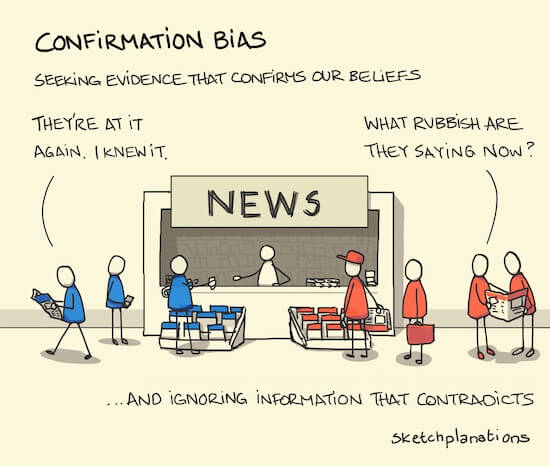The lack of awareness is particularly strong around our biases. There are many types of biases.

“Awareness is the greatest agent to change”
This quote comes from mentor and friend Suki Laniado Smith, a wonderful coach and guide. Without awareness, we cannot seek to change, or as I have written about many times from different perspective, “you cannot see the goldfish bowl you are swimming in”
This lack of awareness is also particularly strong around our biases. As I wrote about in a longer article: “You cannot eliminate your biases“, there are many types of biases.
Of all of these, one of the ones we are often least aware of, as well as least willing to change when confronted by it, is confirmation bias. I find so much of this in our world right now, particularly aroudn the pandemic and in the tendency to follow our fears down rabbit holes and into echochambers on social media populated only by those who confirm and amplify our existing views.
So, to a a recent “Sketchplanations” post from their picture above:
Confirmation bias
Confirmation bias is the big one. The bias that leads us to live in a world of our own choosing, finding the information that already fits with our beliefs and ignoring or discounting what doesn’t. It’s the bias that makes two sides get further apart rather than closer together.Edward De Bono in Water Logic suggested a metaphor for thought as channels of water. As water runs through the channels the channels get deeper, and as they get deeper it pulls more of the water into the main channels until there is only one way. Confirmation bias can act like that.
It’s important to work to understand different opinions, not discount them upfront. To use our empathy to understand why others feel the way they do. And when we deliberately seek out information that challenges our point of view we will usually find a richer, more nuanced world that helps build bridges with others rather than drive us apart.
https://sketchplanations.com/confirmation-bias
The deeper we allow our riverbed grooves to go, the more challenging we may find it to move past our confirmation biases.
Awareness that we have such riverbeds is the first step to change.
